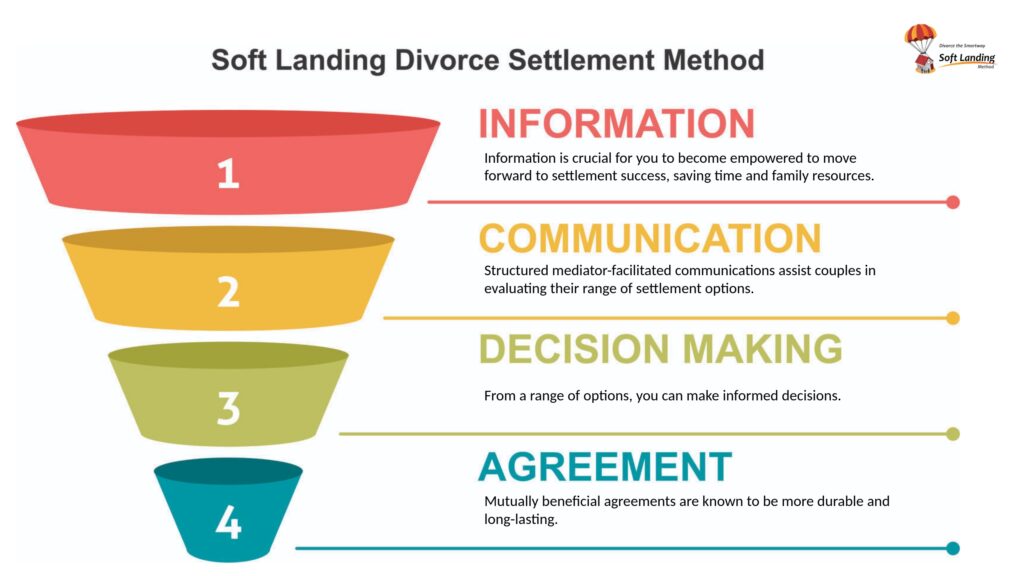The Essentials of Ontario Prenuptial Agreements – whats a Prenup

A prenuptial agreement’s financial terms determine any monetary settlements upon divorce
A prenuptial agreement (prenup) is a legally binding contract that specifies how assets and finances will be handled if a marriage ends. The amount of money you may receive depends entirely on the specific terms negotiated and agreed upon before marriage.
A properly structured prenup typically addresses:
- Property division – how assets acquired before and during marriage will be split
- Financial support – whether spousal support (alimony) will be provided
- Asset protection – safeguarding of family businesses, inheritances, or other specific assets
- Debt responsibilities – how shared and individual debts will be handled
It’s essential to have independent legal counsel review any prenuptial agreement before signing to understand your financial rights and obligations fully.
Discuss prenuptial agreements early in a calm, private setting with open communication
Bringing up a prenuptial agreement requires thoughtful timing and sensitivity. The best approach is to start the conversation well before wedding planning begins, ideally when discussing other long-term financial goals as a couple.
- Choose a quiet, private location free from distractions
- Start with a discussion about shared financial values and goals
- Frame the conversation as protecting both partners’ interests
- Be prepared to listen and address any concerns openly
- Consider involving a financial advisor or mediator to facilitate the discussion
Remember that transparency and mutual respect are essential when discussing prenuptial agreements. Approach the topic as a practical financial planning tool rather than a lack of trust or commitment.
Prenuptial agreements are highly effective when properly drafted and executed according to legal requirements.
A well-crafted prenuptial agreement provides clear financial protection and helps couples avoid costly disputes during separation or divorce. These legal documents are particularly effective at:
- Protecting pre-existing assets and family inheritances
- Establishing clear property division guidelines
- Safeguarding business interests and investments
- Defining financial responsibilities during marriage
- Reducing potential legal costs in case of divorce
However, the effectiveness depends on proper execution, including full financial disclosure, independent legal advice for both parties, and compliance with provincial family law requirements. Courts generally uphold prenuptial agreements unless there are signs of coercion, fraud, or unfair terms.
A prenuptial agreement should be completed at least 3-6 months before your wedding date
Getting a prenuptial agreement requires careful planning and open communication between both parties. The ideal timing allows for thorough consideration of all financial matters and legal requirements.
Here are key reasons to start the prenup process early:
- Ensures both parties have adequate time to seek independent legal counsel
- Reduces potential claims of duress or pressure near the wedding date
- Allows time for thoughtful negotiation and financial disclosure
- Provides opportunity to make revisions if needed
- Creates a less stressful experience by avoiding last-minute rushes
Starting early demonstrates that both partners are approaching the agreement with transparency and good faith, which strengthens its legal validity.
A prenuptial agreement is legally binding in Canada when properly executed and meets all legal requirements.
A prenuptial agreement (also called a marriage contract or prenup) becomes legally enforceable when it satisfies specific legal criteria. To ensure validity, the agreement must:
- Be in writing and properly signed by both parties
- Include full financial disclosure from both partners
- Be signed with independent legal counsel for each party
- Be free from coercion, fraud, or undue influence
- Be signed well in advance of the wedding date
- Contain reasonable and legal terms
However, courts may still review and potentially overturn prenuptial agreements if they’re deemed unconscionable or if circumstances have changed significantly. It’s essential to work with qualified family law professionals to create a robust agreement that protects both parties’ interests.
A prenuptial agreement provides financial protection and clarity for both partners before marriage
A prenuptial agreement (prenup) is a valuable legal tool that helps couples establish clear financial expectations and protect their interests before marriage. This legally binding document offers several important benefits:
- Protects pre-existing assets and family inheritances
- Clearly defines financial responsibilities during marriage
- Reduces potential conflict and legal costs if separation occurs
- Safeguards business interests and intellectual property
- Ensures fair treatment of children from previous relationships
While some couples may feel uncomfortable discussing a prenup, having open conversations about finances early can actually strengthen relationship transparency and trust. It’s particularly recommended for those entering marriage with significant assets, business ownership, or complex financial situations.
A prenuptial agreement requires working with a qualified family law professional to create a legally binding contract before marriage.
Obtaining a prenuptial agreement (also called a marriage contract in Canada) involves several important steps to ensure it’s legally valid and protects both parties’ interests.
- Schedule individual consultations with experienced family law lawyers to understand your rights
- Provide complete financial disclosure, including assets, debts, and income
- Work with your lawyers to negotiate and draft the agreement terms
- Review the final document carefully before signing
- Sign the agreement well before the wedding date to avoid claims of duress
Both parties must receive independent legal advice and enter into the agreement voluntarily for it to be enforceable under Canadian law. The process typically takes 2-3 months to complete properly.
A prenuptial agreement protects personal assets, debts, and establishes financial terms before marriage
A properly drafted prenuptial agreement (prenup) provides essential financial protection for both parties entering marriage. This legal document clearly outlines how assets and liabilities will be handled during marriage and in case of divorce.
A prenup typically protects:
- Pre-existing assets including property, investments, and family inheritances
- Business interests and intellectual property rights
- Personal debt obligations to prevent shared liability
- Future income including salary increases and retirement benefits
- Spousal support terms including conditions and limitations
- Family heirlooms and items of sentimental value
It’s important to note that prenups in Canada cannot include provisions about child custody or support, as these must be determined based on the child’s best interests at the time of separation.
A prenuptial agreement becomes legally binding and determines asset division and support terms during divorce proceedings
When divorce occurs, your prenuptial agreement serves as a legally enforceable contract that outlines how your marriage dissolution will be handled. The prenup’s specific terms take precedence over standard divorce laws, provided the agreement was properly executed and meets legal requirements.
The agreement typically governs:
- Property division – how assets and debts acquired before and during marriage are split
- Spousal support – whether alimony will be paid and in what amount
- Business interests – protection of business assets and future earnings
- Inheritance rights – treatment of inherited property and family heirlooms
However, certain elements like child custody and support cannot be predetermined in a prenup, as these must be determined based on the child’s best interests at the time of divorce.
A prenuptial agreement legally protects assets and defines financial obligations before marriage
A prenuptial agreement (also called a marriage contract in Canada) is a legally binding document that establishes how financial matters will be handled if a marriage ends through divorce or death. This contract helps couples clearly outline their financial rights and responsibilities.
A properly drafted prenuptial agreement typically covers:
- Asset division – How property and financial assets acquired before and during marriage will be distributed
- Debt responsibilities – Who will be responsible for debts incurred before and during marriage
- Spousal support – Whether alimony will be paid and how much
- Business interests – Protection of business assets and future income
- Inheritance rights – How inherited property and family heirlooms will be handled
While not romantic, a prenuptial agreement can help prevent costly disputes and provide peace of mind for both parties entering marriage.
A prenuptial agreement outlines financial arrangements and property division in case of marriage dissolution.
A comprehensive prenuptial agreement typically includes several key elements that protect both parties’ interests. This legal document establishes clear guidelines for managing financial matters if the marriage ends.
Common elements included in a prenup:
- Asset division – How property and investments acquired before and during marriage will be distributed
- Debt responsibilities – Allocation of existing and future debts between spouses
- Spousal support – Terms and conditions for alimony or maintenance payments
- Business interests – Protection of business ownership and future profits
- Inheritance rights – Provisions for inherited property and family heirlooms
- Retirement accounts – Treatment of pension plans and retirement savings
A prenuptial agreement in Ontario typically costs between $1,500 to $5,000+ per person
The cost of a prenuptial agreement (also called a marriage contract) in Ontario varies based on several key factors. A basic prenup starts around $1,500, while more complex agreements can exceed $5,000 per person.
The final cost depends on:
- Asset complexity – More assets and financial arrangements require additional documentation and review
- Legal representation – Each party must have independent legal counsel, with lawyer rates typically ranging from $300-600 per hour
- Negotiation time – Multiple drafts and extensive negotiations increase the overall cost
- Geographic location – Legal fees tend to be higher in major urban centres like Toronto compared to smaller Ontario communities
While the upfront cost may seem significant, a properly drafted prenuptial agreement can provide valuable financial protection and clarity for both parties entering marriage.
A prenuptial agreement in Ontario requires independent legal counsel and full financial disclosure from both parties
Obtaining a domestic contract (prenuptial agreement) in Ontario involves several essential steps to ensure legal validity. The process must be completed before marriage and requires careful consideration of both parties’ interests.
- Consult a qualified family law lawyer with experience in prenuptial agreements
- Provide complete financial disclosure, including all assets, debts, and income
- Ensure both parties obtain independent legal advice from separate lawyers
- Allow sufficient time before the wedding for proper review and negotiation
- Include clear terms about property division, support obligations, and other financial matters
- Ensure the agreement is properly signed and witnessed
The agreement must be fair, reasonable, and entered into voluntarily without duress or pressure to be legally enforceable in Ontario courts.
A prenuptial agreement is a legal contract between couples that protects assets and outlines financial responsibilities before marriage.
In Canada, a prenuptial agreement (also called a marriage contract or domestic contract) is a legally binding document that couples sign before getting married. This agreement clearly establishes how financial matters and property will be handled during marriage and in the event of separation or divorce.
A properly drafted prenup typically covers:
- Division of property and assets acquired before and during marriage
- Treatment of family inheritances and gifts
- Allocation of financial responsibilities during marriage
- Protection of business interests and investments
- Handling of debt obligations and liabilities
To be legally valid in Canada, both parties must provide full financial disclosure and obtain independent legal advice before signing. The agreement cannot include provisions about child custody or support, as these must be determined based on the child’s best interests at the time of separation.
Types Domestic Contracts in Ontario

External links that may interest you
- Prenuptial Agreement in Ontario – Legal protection over assets acquired before marriage.
- Comprehensive Overview Of Prenuptial Agreements In Ontario – Enforceability and validity requirements.
- How to Get a Prenup Agreement in Ontario – Steps and legal form requirements.
- Marriage & Prenuptial Agreement Ontario | Toronto – Terms and conditions for signing a prenup.
- Prenuptial Agreement in Ontario: What to Know Before – Includes obligations and property division.
- Prenuptial Agreement In Canada – Enforceability and potential challenges.
- 10 Reasons to Get a Prenuptial Agreement in Ontario – Safeguard pre-marital assets.
- Get A Prenup – Understanding Ontario family law and prenup benefits.
- Marriage Contract/Prenup in Ontario – Divorce Office – Completing a marriage contract.
- PRENUPTIAL AGREEMENTS IN CANADA | The Law – Enforceability in Canadian provinces.
- Prenuptial Agreement Ontario: A Comprehensive Guide – Outlining asset distribution upon separation or divorce.
- Prenuptial Agreement – Ontario – Fast and easy online service for prenups.
- The Essentials of Ontario Prenuptial Agreements – Importance of full financial disclosure.
- Prenuptial Agreement Ontario – Drafting and enforcing marriage contracts.
- Do you need a prenuptial agreement in Ontario? – Investment in financial transparency.
- Prenuptial agreement & marriage contracts guide for Ontario – Cost and complexity considerations.
- Customizable Prenuptial Agreements for Canadians – Domestic contracts created before marriage.
- Prenuptial Agreement Law – Importance of legal representation for enforceability.
- Prenuptial Agreement – Qualifications and requirements for marriage contracts.
- Prenup Agreement In Ontario – Family Lawyers – Specifying financial support terms.
Ken Maynard CDFA, Acc.FM
I assist intelligent and successful couples in navigating the Divorce Industrial Complex by crafting rapid, custom separation agreements that pave the way for a smooth transition towards a secure future. This efficient process is achieved in about four meetings, effectively sidestepping the excessive conflicts, confusion, and costs commonly linked to legal proceedings. Clients have the flexibility to collaborate with me either via video conference or in-person through a DTSW associate at any of our six Greater Toronto mediation centers, located in Aurora, Barrie, North York, Vaughan, Mississauga, and Scarborough.















































